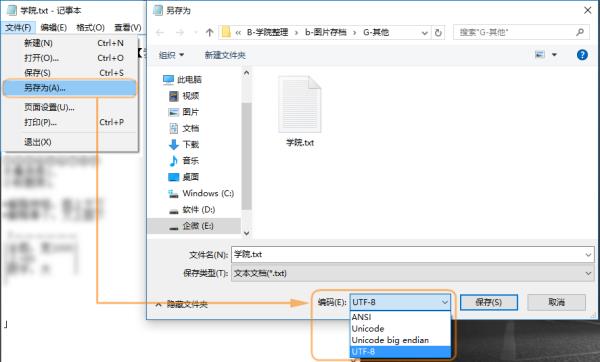c语言怎么把UTF-8转换成Unicode
Posted
tags:
篇首语:本文由小常识网(cha138.com)小编为大家整理,主要介绍了c语言怎么把UTF-8转换成Unicode相关的知识,希望对你有一定的参考价值。
参考技术A下面程序给出的是UTF-8转成Unicode(UCS-2)的函数:
#include <stdio.h>
#include <stdlib.h>
#include <memory.h>
#include <string.h>
int utf8_to_unicode(char* pInput, char** ppOutput)
int outputSize = 0; //记录转换后的Unicode字符串的字节数
*ppOutput = (char *)malloc(strlen(pInput) * 2); //为输出字符串分配足够大的内存空
memset(*ppOutput, 0, strlen(pInput) * 2);
char *tmp = *ppOutput; //临时变量,用于遍历输出字符串
while (*pInput)
if (*pInput > 0x00 && *pInput <= 0x7F) //处理单字节UTF8字符(英文字母、数字)
*tmp = *pInput;
tmp++;
*tmp = 0; //小端法表示,在高地址填补0
else if (((*pInput) & 0xE0) == 0xC0) //处理双字节UTF8字符
char high = *pInput;
pInput++;
char low = *pInput;
if ((low & 0xC0) != 0x80) //检查是否为合法的UTF8字符表示
return -1; //如果不是则报错
*tmp = (high << 6) + (low & 0x3F);
tmp++;
*tmp = (high >> 2) & 0x07;
else if (((*pInput) & 0xF0) == 0xE0) //处理三字节UTF8字符
char high = *pInput;
pInput++;
char middle = *pInput;
pInput++;
char low = *pInput;
if (((middle & 0xC0) != 0x80) || ((low & 0xC0) != 0x80))
return -1;
*tmp = (middle << 6) + (low & 0x7F);
tmp++;
*tmp = (high << 4) + ((middle >> 2) & 0x0F);
else //对于其他字节数的UTF8字符不进行处理
return -1;
pInput ++;
tmp ++;
outputSize += 2;
*tmp = 0;
tmp++;
*tmp = 0;
return outputSize;

扩展资料
UTF-8:互联网的普及, 强烈要求出现一种统一的编码方式。 UTF-8就是在互联网上使用最广的一种unicode的实现方式。其他实现方式还包括UTF-16和UTF-32,不过在互联网上基本不用。重复一遍,这里的关系是,UTF-8是Unicode的实现方式之一。
UTF-8最大的一个特点,就是它是一种变长的编码方式。它可以使用1~6个字节表示一个符号,根据不同的符号而变化字节长度。
UTF-8的编码规则:
UTF-8的编码规则很简单,只有两条:
1、对于单字节的符号,字节的第一位设为0,后面7位为这个符号的unicode码。因此对于英语字母,UTF-8编码和ASCII码是相同的。
2、对于n字节的符号(n>1),第一个字节的前n位都设为1,第n+1位设为0,后面字节的前两位一律设为10。剩下的没有提及的二进制位,全部为这个符号的unicode码。
以上是关于c语言怎么把UTF-8转换成Unicode的主要内容,如果未能解决你的问题,请参考以下文章